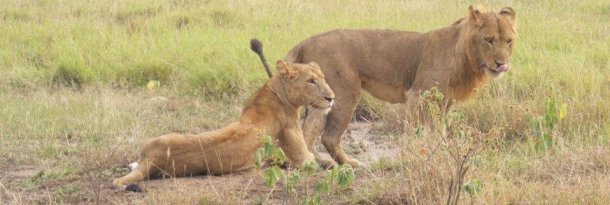|
|
|

Closely related to the tiger, jaguar and leopard, the male African lion rests for around 20 hours a day, leaving it up to the females to hunt. They live in prides of normally around five or six females, any cubs and perhaps one or two males who may stay for a few years before moving on, often after losing a battle with a new, more dominant male.
The African lion becomes sexually mature at two years old, has no particular mating season, and has 2-5 cubs at a time. Their gestation period is typically 110 days however only around one out of every five cubs reaches the age of 2yrs as their mortality rate is high. At the age of 2yrs they will leave the care of their mother. The Africa lion's diet consists of basically any prey from impala to giraffes and hogs, even rhinos and hippos. They remain wary of the size of elephants however have been known to attack when food is scarce. They also eat smaller mammals such as hares and won't think twice about stealing kills made by hyenas and wild dogs. Most kills are made by strangulation or by suffocation with the lion clamping its own mouth over that of its prey. They will establish a territory of approximately 100 square miles and mark out that territory with the smell of their own urine and faeces together with roaring that can be heard for up to six miles to ward off intruders and other prides. Despite this they are rarely active during the days, preferring to hunt during the cooler nocturnal period of early evening and morning spending their days instead sleeping, copulating (up to 40 times a day!) and being affectionate with other pride members; being noted as one of the most sociable of the Big Five animals. Now check out our LIVE lion webcam broadcasting here. |



 When a new male lion joins a pride he will normally kill all existing cubs from previous relationships as this will extend his time with the female knowing that if he were to allow the cubs to live one day one of them will either kill him or drive him out.
When a new male lion joins a pride he will normally kill all existing cubs from previous relationships as this will extend his time with the female knowing that if he were to allow the cubs to live one day one of them will either kill him or drive him out.


